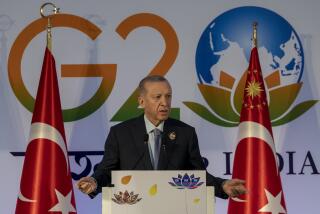Turkey Sending Out Mixed Signals on Baghdad Ties : Diplomacy: Ankara leader sees gains if Hussein falls, but his nation may resume ties with Iraq.
- Share via
NEW YORK — Turkey, the North Atlantic Treaty Organization member that placed restrictions on allied flights from its bases during recent operations against Iraq, sent out mixed signals Wednesday on its relations with Baghdad.
In New York, President Turgut Ozal said he believes the toppling of Iraqi leader Saddam Hussein and the establishment of democracy in Iraq will solve the problems of the Middle East.
But in Ankara, a Foreign Ministry source said Turkey plans to base a diplomat in Baghdad for the first time since the start of the Gulf War in January, 1991.
Asked on the “CBS This Morning” television program if Hussein should be toppled, Ozal said: “Yes. But I think what is necessary (is) to bring democracy to Iraq. This will solve all problems in the Middle East, and the future problems, at the same time.”
Ozal is scheduled to meet President Clinton next Monday.
The Turkish president said he wants to tell the new U.S. leader that Turkey has had a great deal of historical experience in the Middle East as well as the Balkans and the Caucasus region.
“I want to tell (Clinton) what is our experience and what is our thinking. And I think we will have some good information, probably right information, for Clinton Administration,” he said.
Meanwhile, the Foreign Ministry source in Ankara said that Sadi Calislar had been chosen as charge d’affaires in Baghdad but that it would be up to the government to decide exactly when he would take up his post in the Iraqi capital.
The Turkish government decided in June to reactivate the embassy but then postponed any action--to the relief of its Western allies, which feared that Hussein would portray any such move as a crack in the Gulf War coalition.
“The allies are still not very happy. They say Saddam will use this for propaganda purposes,” the source said.
But he said the government had shown it was not breaking ranks with the coalition by conditionally allowing Turkey-based Western warplanes to hit targets in northern Iraq last month when they reported coming under threat from Iraqi antiaircraft systems.
Ankara proved itself a staunch U.S. ally during the Gulf crisis. It choked off Iraqi oil exports through a pipeline that crosses Turkey, enforced U.N. trade sanctions and let American planes bomb Iraq from its Incirlik air base in southern Turkey.
More to Read
Sign up for Essential California
The most important California stories and recommendations in your inbox every morning.
You may occasionally receive promotional content from the Los Angeles Times.













